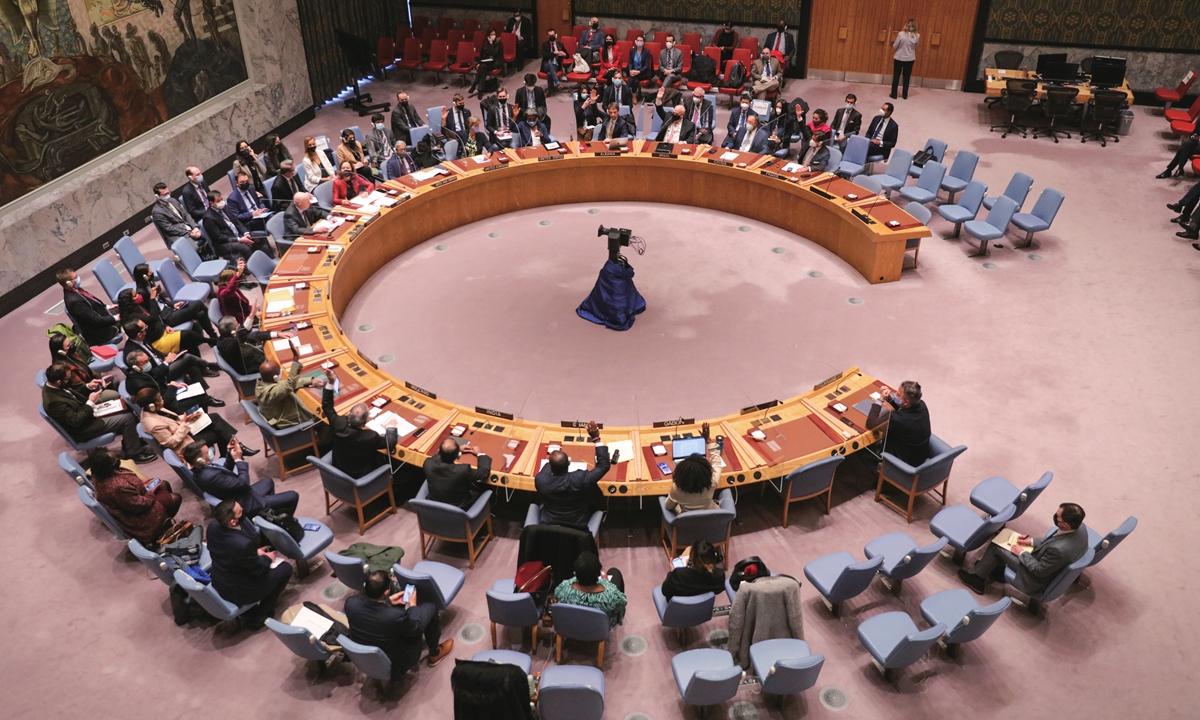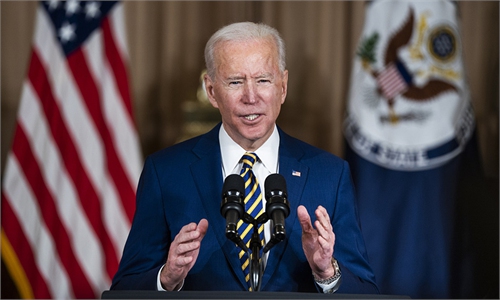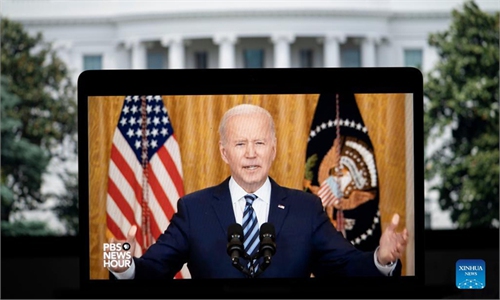
The UN Security Council votes on a draft resolution requesting a UN General Assembly emergency session on Ukraine at the UN headquarters in New York, on February 27, 2022. Photo: Xinhua
Click here to stay tuned with our live updates on Ukraine tensions.The Ukrainian crisis is actually a new round of adjustment in the post-Cold War international situation. Because of its unique geopolitical status, Ukraine is fostering long-term rivalry between major world powers with the so-called "butterfly effect."
Behind the conflict in Ukraine, there is not only the relationship between Kiev and the Eastern region, as well as the escalation of the conflict between Russia and Ukraine, but also the dispute between Russia and the US. The 2014 color revolution in Ukraine has not only resulted from internal divisions caused by the government's policy of overthrowing the legitimately elected President, but has also been a proxy war between Russia and the US.
The Ukrainian issue is the turning point in the long-term conflict between Russia and the US-led West. Behind the crisis, there is the historical entanglement between the US and Russia in the post-Cold War period. In the first 12 years after the Soviet Union's implosion, Russia eagerly and naively wanted to integrate itself into the Western world dominated by the US. Nevertheless, a Russia with full self-sustaining diplomatic and military capabilities has always been a US concern.
We have seen the US ignore its commitment vis-à-vis Russia whereby NATO would not expand eastwards when the Warsaw Pact was dissolved, and gradually the US eroded the former Soviet Union's leeway and sphere of influence.
In the eyes of Putin's government and of most Russians, however, the US behavior completely ignores the Russian security concerns and continues to compress and weaken the Russian strategic space for its survival and development. Before the outbreak of the Ukrainian conflict, the basis of strategic trust in Russia-US relations had long vanished over the years.
The Ukrainian crisis has become the trigger for the quick deterioration Russia-US relations, thus turning Russia's defensive tactics towards the US from a moderate resistance into a stern factual warning, as the US has challenged the Putin government's strategic bottom line in two ways.
Firstly, Russia cannot stand idle faced with the political situation in which the West controls its surrounding strategic buffer zone, thus enabling NATO to expand eastward to the Commonwealth of Independent States (CIS) countries to threaten the security of its borders, and above all, it does not want to give the US an opportunity to turn Ukraine into a military beachhead to contain and threaten - with the nuclear weapons on its borders - the Russian State.
Secondly, from the Putin Administration's viewpoint, Ukraine's inclusion in the EU - by the US' will - is intended to undermine the Russian-led "Eurasian Union". The "Eurasian Union" is an important commitment of Putin's third term, and hopes to achieve market and resource integration in the CIS, as well as reshape the status of Russia as a regional power. Ukraine is the most crucial part of it. The US and the West see the "Eurasian Union" as an expression of Russia's ambition to geopolitically rebuild the Soviet-Russian empire. The US global hegemony cannot accommodate the dream of a regional power that Russia is unwilling to give up. This, too, is a structural contradiction between the US and Russia.
The US does not want a gradual easing of the Ukrainian crisis, let alone a solution according to a political agreement favorable to Russia. The US is using Ukraine to foster the contradiction between Russia and Europe. It is using Europe - without an elected and therefore unambiguous leadership or even an army - to weaken Russia's power and strength and make Russia and the EU (which has anyway an interest in good relations with the Kremlin) diplomatically confront and consume each other.
The Ukrainian crisis, however, was not enough to shake the fundamental relationship between Russia and Europe. There is no structural political contradiction between Russia and Europe - quite the reverse. Economic ties are very close. The economic losses caused by Western sanctions against Russia are mainly borne by EU member states and now most of these countries would not want sanctions.
Looking away from Europe, the continuation of the Ukrainian crisis and the deterioration of US-Russia relations will certainly influence the positioning of US strategy in Asia-Pacific and China. If the Ukrainian conflict were to continue and turn into a long-term tug-of-war, the US could change its current rebalance to Asia-Pacific strategy, which focuses on containing China. From the Realpolitik perspective, the structural contradiction between China and the US is based on changes in the balance of power and is much more important than the strategic contradiction between the US and Russia.
The US policy of containing China in the Asia-Pacific region and Russia's continued weakening in Europe would go hand in hand. In view of avoiding the weakening of its dominance in key strategic regions, the US has done its utmost to prevent China and Japan from cooperating in Asia, while - in Europe - it has tried to prevent Russia and the EU from achieving strategic reconciliation and mutual trust - over and above the long-standing and fruitful trade relations. The US, whose very costly relative power of expansion is declining - with the American people, unlike the New England elites, has always preferred isolationism and non-intervention abroad - is pushing the international community and regional powers to confront China and Russia so as to maintain the legitimacy of its dominance in the Asia-Pacific region and in Europe. This has proved to be destructive rather than inspiring.
Both China and Russia have worked hard to be recognized and accepted by the international community on equal terms and conditions, but the West - in the service of the US - cannot tolerate the ideas advocated by nation-States with great power aspirations. They cannot accept them on the basis of their characteristics, development model and political way of managing society.
From a practical economic perspective, the Ukrainian crisis and Western sanctions may firstly lead to changes in the global energy model, and the layout of the Russian energy export market has already started to shift towards Asia. For China, which has huge energy needs and seeks to diversify risks through multiple channels, this is an opportunity. China has recently signed a gas agreement with Russia after 10 years of negotiations. Western sanctions will certainly force Russia to develop an ever deeper financial relationship with China.
Western sanctions have already led the Putin government to start promoting the Russian market's diversification in terms of economic strategy. Economic countermeasures against Europe entail the large-scale transfer of the market for agricultural products elsewhere and may continue to expand in the field of industrial products, expansion and penetration in the construction of high-speed railways, agriculture, military technology, satellite navigation systems, ports, logistics, IT industry, manufacturing, nuclear energy and many other fields.
Since China and Russia also have common strategic needs that go beyond economic interests, relations between the two countries are increasingly limited to mutual benefit and pragmatic cooperation on a purely economic level. China and Russia are facing the combined forces of the US-led alliance system in East Asia and Europe, respectively. The East China Sea, South China Sea and Ukraine are only specific points of struggle. The central problem is that - as great military powers with a long history and civilization - neither China nor Russia can accept the path laid out by the US and the West to determine their own internal affairs and foreign policies.
Over the last two decades and until a few months ago - from the viewpoint of concrete actions - we have seen that the US strength has gradually lost the ability and willingness to create constructive situations of world peace and prosperity, creating instead situations of conflict that worsened the scenario. The US used the South China Sea, the Diaoyu Islands and Ukraine to fuel disputes in Asia and Europe and start a series of color uprisings in Europe - and then the "Arab Springs" in the Middle East, West Asia and North Africa - but it was later unable to remedy the situation, as demonstrated in Afghanistan.
At a time when the US intervenes everywhere but fails to solve its own self-created problems, there are only chaos and winds of war. This requires that cooperation between Russia and China should not be limited to bilateralism, but should also further unite regional powers such as India, Brazil and South Africa and play a greater role in the mechanism of cooperation in emerging markets and in the public and political spheres of countries that can still call themselves independent.
The author is "Honorable" of the Académie des Sciences de l'Institut de France. opinion@globaltimes.com.cn


